
Inspired by Bob Arnold’s playground, I’m going to leave some breadcrumbs here that others might want to follow. My aim is to whittle down two large stacks of reading done in the past year, which had built up while I slowly came to the realization that I will never have the time or strength to write in any detail about them all. These morsels I offer in lieu of the more in-depth reactions all of these books deserve. These are in addition to the books I’ve already written about–the ones read during our annual sojourn in Mexico and those formally reviewed in the past year. (Note: I can’t figure out how to segregate by year all instances of a particular post label, so the “reviews” link above brings up all the reviews I’ve done so far.) I’ve also not applied thumbs up or thumbs down icons; they seemed like a good idea, but now … not so much. Let me add that the order of things below is irrelevant: I took each book as it came off the stack of books beside my desk. And finally, because Blogger limits us to 200 characters for labels to a single post, I’m breaking this “anthology” into two parts. I trust that won’t make it too difficult to follow!
~~~
I first heard of Reginald Shepherd through his posts on Harriet, which led me to his own blog, which in turn led me to his books. Reginald passed away in 2008, but most of my reading around his work was done this year.
From FATA MORGANA
by Reginald Shepherd
WITH THE WIND BLOWING THROUGH IT
Special instructions
to the spinner of webs, the knotter
of strings, the weaver
of cloth, the plaiter of nets,
the thrower of ropes
over chasms, special instructions
to the builder of bridges,
the stitcher of wounds and torn skin,
the cable and the thread:
Special instructions to the rain
and assorted precipitations,
evaporations, condensations
connecting earth and air, one place
melting into the brother place
just for a moment, my place
and how I lost it:
Special instructions
to the layers of roads, the asphalt,
blacktop, and cracked macadam, special
instructions to the puddled
ends of slanted driveways, muddled water
pooling its resources, reflecting
on the live oaks, longleaf
pines, the skies trees stitch together
while clouds disperse, air crowded
with plant sex, my nostrils
filled with plant sperm:
The same sky keeps happening
but differently each time
(today with finches in it)
From OTHERHOOD
by Reginald Shepherd
CYGNUS
For Geoffrey Nutter
Persons reminded me of birds, a boy
who is a swan and is not mine,
white feathers that go by
clouds. He figures as constellation,, clouds
in tight formation, forming him
or his impossibility of skin. That he is seen
to be beautiful, that he is called by strangers’
names, almost persuaded of September: that he
is torn from the white he makes
his home, falling as snow, down.
Boy who became a swan, buoyed through
blank night, stick figure fixed to several skies: wing
for a writing arm, he is a poet
scribbling down stars, their mouths
pinned open, hungering
in place. That he is seen to take flight
in magnitudes, that he persuades
himself to be observed at different proximities
to the horizon, that light bends
from him relative to the position he takes
regarding the sun. Star-mouth,
cloud-lip, northerly wing, my hands
are talced with a dust of feathers,
my hands are full of birds, all thumbs.
You fly through me.
From WRONG
by Reginald Shepherd
AT THE GRAVE OF HART CRANE
For Michael Bonner
Mobile light paints me an undertow, trailing
a northeasterly hand through day, riptide
scattering coins of noon: silvers
surface currents to the key of water foaming
where it bickers with the rocks. Sings there
till sunset. This is my saltless sea, my
estuary, inlet, delta, eddy becalmed: no tides
in Lake Michigan, no shore this side, or
barely one. A drunkard preaching
to Lincoln Park asks late April, air, What hage
you given? These five flat rocks bearded
with algae, quincunx, this cup-shaped crack
lakewater pours up into, overflowing,
pours away again, under itself. This
neap tide captured, something always
in-between, half solid water, half liquid
land, least difference washing itself away.
White-shining autumn, early, wave crest,
silver-tipped, I’m tired of the ocean
metaphors, old sea in me and thee:
a skeleton of sea, shape left behind
by what is left, just this idea of water. someone
floating, someone sinking just out of sight,
drowning in earnest one more time. I believed
in his unsheltered sea, made my way
to cold fresh water, then lost heart.
From ORPHEUS IN THE BRONX: ESSAYS ON IDENTITY, POLITICS, AND THE FREEDOM OF POETRY
by Reginald Shepherd
[from “THE OTHER’S OTHER”]
I am a product of a nation defined by racial difference, and so, unsurprisingly, difference has always obsessed me, possessed me (the difference I possess possesses me). And that difference itself is not unitary; it incorporates many different differences: the multiple differences between myself and other people, both black and white, gay and straight, poor and better off, the myriad differences among my selves. How could I lay claim to any one self and say, “This is mine,” “This is me”? All my life I have been aware of what I was not, and of the lack that my not-being represented. This discontent is also a source of my work: a contented life would not, for me, require a supplement, would not demand that excess of the already-given which we call art. Social circumstance (let’s call it the presence of history) has made the distance between self and imago, between the self one is given and the self to which one aspires and which one can never attain, an abyss by which we are all burdened (it is in and by means of that impossible aspiration that “self” is formed), inescapably conscious for me. At an early age I was struck by the distance between a word and its sense, the chasm between names and things, sings and their objects: the difference between being and meaning haunted me, taunted me. The connections between this experience of difference as lack and more obviously social differences are clear, and clearly tangled.
From THE ROMANTIC DOGS
by Roberto Bolaño (tr. Laura Healy)
DAY BLEEDING RAIN
Oh, day bleeding rain,
what are you doing in the soul of the abandoned,
day bleeding volition only barely glimpsed:
behind the reed curtain, in the mire,
with your toes seized up in pain
like a small shivering animal:
but you’re not small and you’re shivering from pleasure,
day cloaked in the might of volition,
frozen stiff in a mire that’s maybe not
of this world, barefoot in the middle of the dream that works its way
from our hearts toward our necessities,
from fury toward desire: curtain of reeds
that opens itself and dirties us and embraces us.
From NO SHELTER: THE SELECTED POEMS OF PURA LÓPEZ-COLOMÉ
by Pura López-Colomé (tr. Forrest Gander)
DRAMATIS PERSONAE
My voice went on, its tones varying.
It paused. it believed it could not go on
and it continued.
In this manner it articulated a path
never before described,
a place of which it was part
without knowing it.
To which it returned afterward.
It opened its doors,
allowing a beginning for the ears.
The cochlea surging forward,
satiating all expectations,
penetrating the body
in whelming red.
Later your blizzard voice
from the bowers
of hibernal forests,
orchards in the tundra,
from the oak, the cedar,
and from the tamarind,
blew across the awakened ones
who continue on their way
savoring
the dry melodies
of thunder.
From THE CONTAGION OF MATTER
by Valerio Magrelli (tr. Anthony Molino)
XOCHIMILCO
I build myself on an absent column.
–Henri Michaux
Bandages, beards of plants, flutter
tenderly downward
connecting with the marsh,
the unseeing, the shoal’s essence,
connecting with me.
Rushes that are earth, rafts,
tongues trembling in the rippling water.
My founding was ritual, devoid
of sense, born of a landslide
I rose from a lack
a stilt in silt
rooted in the void.
From THE SELF-DISMEMBERED MAN: SELECTED LATER POEMS OF GUILLAUME APOLLINAIRE
by Guillaume Apollinaire (tr. Donald Revell)
SHADOW
Newly you are near again
Reminders of my comrades killed in the war
Olive of time
Memories altogether one memory
As one hundred skins make a single coat
As thousands of wounds make a solitary headline
Impalpable somber apparition assuming
The changeable form of my shadow
An Indian on guard throughout eternity
Shadow you crawl near me
But you no longer hear me
You can no longer know the divine poems I sing
But I hear you I still see you
Destinies
Polyshadow may the good sun guard you
You who love me so much you will never leave me
You dance in the sun but raise no dust
Shadow sun’s ink
Light scripture
Gun-carriage of regrets
A god prostrate
From THE PROCESSION OF MEMORIES: SELECTED POEMS 1929-1945
by Harry Martinson (tr. Lars Nordström)
D. H. LAWRENCE
You waited for that hour when things would once again have a soul
and be visited within, on the day of introverted sensuality,
by good taste, soul and affection.
But the world was extroverted.
Only the misunderstandings ripened fully.
That new, deep communion you sang about never happened.
The table was set inside,
but only a few came
and only a few could partake.
The others came out of a sense of curiosity that meant nothing.
Your internal church of the flesh had to close.
Now it stands abandoned in the storm of steel
on the diabolical moor of the extroverted.
~
[Because the previous poem is atypical of Martinson’s work, here’s another, more typical one]
FOG CURTAINS
The fog lifted from a portion of the sea,
the curtain was pulled aside
and the sun started playing with the trade wind.
It had not been this clear for a thousand years!
Near guinea there was a pint buoy, howling for departure,
howled terribly across that small section of the sea which it guarded
and which was believed to be the entire sea.
But the sea was endless—
Far away in the foggy Bay of Whales
a coal tramp rested,
jingled its anchor bells and cried like a locked-up child.
From DIARY OF A WAVE OUTSIDE THE SEA
by Dunya Mikhail (tr. Elizabeth Winslow and Dunya Mikhail)
[Being a two-part book-length poem that chronicles the author’s life in Iraq and her escape to the U.S, Diary is impossible to represent well by a single excerpt, so I’m offering two]
~Excerpt 1
Everything was shaking.
The city and the people inside the city,
the hears inside the people,
and the people inside the hearts.
The planes circled over the capital,
pumping its residents into the villages
toward an unknown fate
and toward the questions of children
that grownups do not know the answers to.
The planes flew over Al-Tahrir Square,
filling the eyes of Jawad Salim with dismay
as his horses left the city.
The planes flew over the shelters . . .
Over the debris that collected in the shelters
Over the children who slept under the debris
Over the body parts that had been children
Over the ash the body parts became
Over the walls sprinkled with ash
Over the drops of blood on the walls . . .
In war, no one is rescued from death.
The killed die physically
and the killers die morally.
In this age of words like Missiles. Aircraft. Bombardment. Blockade.
Sanctions. Slogans.
In such an age Romeo and Juliet commit suicide
not out of love but out of anger and disapproval.
Smoke.
Smoke rises
from the burning houses
from the cigarette of an American soldier who feels guilty
from a cat’s tail.
The Desert Storm drops birds of shame,
and kings smile at statues of themselves and pray:
Oil is greatest . . .
And the rivers continue their usual flow
as if we are invisible,
always hidden under the debris.
The disaster watches over us at night
–our recurring, endless night–
like a verb with no subject or object.
~Excerpt 2
America is but a baby of a country.
She doesn’t really mean to cause problems.
She always thinks it’s easier to replace problems
than to fix them. “Your washer is broken,”
the repairman says. “It is easier to replace it than to fix it.”
“You country is broken,” the politician says.
“It is easier to replace it than to fix it.”
America bombs with one hand
and shelters with the other.
It used to be hard for people in my big, new country
to find my small, old one on the map.
But the war made it popular.
It is often featured on the front page
of the newspaper like a Hollywood star.
Americans use positive phrases
even in the worst situations.
It is easy to be optimistic when you are young.
From THE STRIPED WORLD
by Emma Jones
WAKING
Here it is again, light hoisting its terrible bells.
As though a world might wake up with it–
the moon shuts its eye. Down in the street
the same trolley is playing the pavestones.
For twenty-five years I’ve been waking
this way. There was one morning
when my mother woke and felt a twitch
inside, like the shifting of curtains.
She woke and so did I. I was like a bird
beating. She had no time for anaesthetic.
We just rolled from each other like indecent genies.
Even the nurses were startled.
Now she says the world and I were eager
from the start. But I was only waking.
From VEIL: NEW AND SELECTED POEMS
by Rae Armantrout
ONGOING
Some cartoon kids
watch cartoons
on a tiny
black-and-white tv
where a sit-com cartoon
couple from the fifties
approach a door
on which a sign reads,
“Don’t exist!”
*
The trick is to
dissove
my gaze
midway between
warning and appeal.
When I’m metaphorical,
I’m happy.
When an effort
was a small engine,
then I loved it
like a mommy.
*
Room alive
with ambient
recapitulation.
Random firing
in my sleep
to balance out
experience,
corporate-funded
homunculi
in an infinite
regress
From HOTEL IMPERIUM
by Rachel Loden
PREMILLENNIAL TRISTESSE
Nixon is slipping
in and out of consciousness. My father
sputtering in Canada, forty7 years
after the blacklist–
We hear there is this love that moves
the world, the sun and stars,
that makes the apple on the Kazakh bough
fall for a reason. My age, my beast,
my fingered rosary of disbelief . . .
It seems that something red as love
is bleeding through the centuries,
that a reservoir of silky human grease
is oiling those celestial machines.
I don’t want to see the zeroes turn
as on a clock about to wake us
from a murderous dream, confetti falling
helplessly into the fissured past.
I don’t want them to unload the gurney
from the festooned ambulance:
the revelers in all their unforgiving
fury, the new patient in her bandages.
From TEMPORARY AGENCY
by Michael Colonnese
RISERS
I was a 27-year-old failure, a carpenter’s helper,
and I was busy cutting risers for the staircase
we were building when the Challenger went down.
A radio was playing oldies in a tangle of orange extension cords
when a news flash interrupted to explain what had happened
and I simply stopped working and listened.
NASA’s astronauts had never been my heroes–crewcut
and cheerful, gung-ho and glib, remote-controlled cowboys
who clearly didn’t know jack about life on planet earth.
4th of July fireworks were as close as I’d ever
get to rocket science, but those golf balls they’d left
in the lunar dust seemed arrogant and a long way off.
So this time I wept a little–somehow the Challenger’s rising
had seemed different, not only because of that teacher on board,
because breakdowns and delays felt more familiar than success,
and the shuttle more like public transportation,
something you could ride in circles if you had nothing
but time and could stomach feeling weightless.
From PALE RAMÓN
by Rane Arroyo
SILLY DANCES
For God, Mother and Father
gave up their best possessions:
the twist, lemonade with Bacardi rum
tasting of winds from lost Puerto
Rico (port rich with what?), Mother’s
ponytail, sexy Sears swimming suits,
public tongues, parties with over 10 people,
library cards, la pachanga (that silly dance)
–and each other. When they gave up God
we were happy until I became a hairy
adult with new gods. What would Uncle Pete,
Jehova’s wWitness, think about my life
in luminous bars? Or my cousin Nancy
who became a sleepwalking nun? Or my aunt,
Señora Santería? Or rachel, the uncle
not allowed to be buried in drag, Our Lady of
Spring Fashion in these the Last Days?
I have found strange places in which to dance,
free to weep through my blue armpits.
I need what the thou shalt nots stole from us.
This list will continue in the next post.



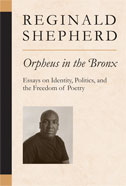



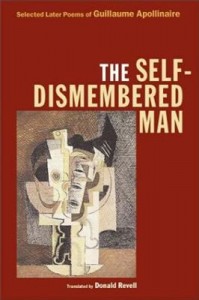
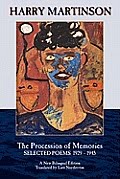

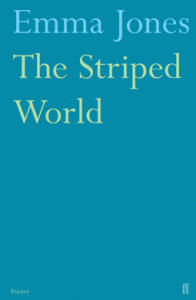
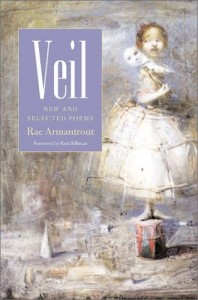



 Joseph Hutchison, Colorado Poet Laureate 2014-2019, has published 20 collections of poems and edited or co-edited three poetry anthologies. He currently directs two master’s-level programs for University College at the University of Denver: Professional Creative Writing and Arts & Culture Management. Joe lives with his wife, Melody Madonna, in the mountains southwest of Denver, Colorado, the city where he was born.
Joseph Hutchison, Colorado Poet Laureate 2014-2019, has published 20 collections of poems and edited or co-edited three poetry anthologies. He currently directs two master’s-level programs for University College at the University of Denver: Professional Creative Writing and Arts & Culture Management. Joe lives with his wife, Melody Madonna, in the mountains southwest of Denver, Colorado, the city where he was born. 










Thanks should go first to the individual poets. I'm just passing their gifts along….
These breadcrumbs are simply a wonderful, exquisite gift!<br />Thank you so much!
This is a great idea/format… thanks. I need to settle in with these poems a bit, but I'm enjoying them!
Happy to be of service, Raksha (aka Linda). Yes, Reginald was an amazing writer and thinker and a real mensch, as Robert Mezey's mother would say. (I'll post Mezey's poem "My Mother" in case you haven't seen it.) Thanks for the kind words!
This is just to let you know I'm bookmarking your blog, which I discovered today via Tad Richards' link. It's worth bookmarking for the work of Reginald Shepherd alone, which I also discovered today through your blog. I regret that I never knew of his existence or his exceptional work until after he passed away. I wish I could have at least posted a comment to tell him how
What a wonderful service. Thank you. I'm linking to it.